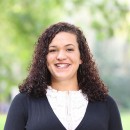Faculty News
Pages

 Karen Staller, Briana Starks and Håvard Aaslund Co-edit Recent Special Double Issue of Qualitative Social Work: Research and Practice
Karen Staller, Briana Starks and Håvard Aaslund Co-edit Recent Special Double Issue of Qualitative Social Work: Research and PracticeAssociate Professor Karen Staller, Joint PhD Social Work and Sociology Student Briana Starks and Visiting Scholar Håvard Aaslund co-edited the recent special double issue of Qualitative Social Work: Research and Practice, “Reflections on a Pandemic: Disruptions, Distractions, and Discoveries.” The double issue contains 86 reflexive essays submitted by authors from 35 different countries (and every continent except Antarctica). Taken together, the essays paint a portrait of the breadth and depth of social work during the earliest months of the historic pandemic from every corner of the globe. Other U-M contributors to the issue include Assistant Professor Odessa Gonzalez Benson, and current doctoral students in Joint PhD Social Work and Sociology Finn Bell and Angela Perone.
- March 8, 2021
- Learn more »
 Matt Smith’s Virtual Training Research Helping Young People with Autism
Matt Smith’s Virtual Training Research Helping Young People with AutismAssociate Professor Matt Smith’s research on how virtual training can help young people with autism is featured in Disability Scoop. “Virtual Interview Training for Transition Age Youth appears to be effective at teaching job interview skills that are associated with accessing competitive jobs,” he says.
- February 22, 2021
- Learn more »
 Daicia Price Discusses Mental Health in Mental Minute with Michigan Medicine
Daicia Price Discusses Mental Health in Mental Minute with Michigan MedicineClinical Assistant Professor Daicia Price discusses mental health in the community in the latest Mental Minute with Michigan Medicine. The Mental Minute discusses a variety of prescient mental health topics and features expert interviews from within and outside the U-M community.
- February 10, 2021
- Learn more »
 Luke Shaefer Spoke with the New York Times on the Child Tax Credit in Biden’s Plan
Luke Shaefer Spoke with the New York Times on the Child Tax Credit in Biden’s PlanLuke Shaefer spoke with the New York Times about the expansion of the child tax credit in Biden’s plan against child poverty. “To me, it’s the most transformational thing that’s under discussion, and nobody’s talking about it,” says Shaefer.
- February 5, 2021
- Learn more »
- Terri Friedline and So’Phelia Morrow call on President Biden to stop the Predatory Burden of Student Loan Debt in Ms. Magazine
Associate Professor Terri Friedline and PhD student So’Phelia Morrow call on President Biden to stop the predatory burden of student loan debt in an article in Ms.“To advance his promises of racial and gender justice and to better ensure an inclusive economic recovery from the COVID-19 pandemic, President Biden should cancel all student loan debt—not just a meager portion of it.” Their article also cites research conducted by a team at Michigan Social Work, which focuses on the physical and mental health tolls women face due to their debts and outstanding obligations.
- January 28, 2021
- Learn more »
 Luke Shaefer Quoted on Biden’s Child Poverty Plan in the New York Times
Luke Shaefer Quoted on Biden’s Child Poverty Plan in the New York TimesProfessor Luke Shaefer spoke with the New York Times about Biden’s child poverty plan. “This is the boldest vision laid out by an American president for fighting poverty, and child poverty in particular, in at least half a century,” said Shaefer.
- January 21, 2021
- Center for Equitable Family & Community Well-Being Lead Ypsilanti COVID-19 Study
Researchers at the Center for Equitable Family & Community Well-Being surveyed more than 600 low-income residents across Ypsilanti about the impact of COVID-19. Their work is giving voice to the needs of those disproportionately impacted by the pandemic, ensuring that local health and economic responses attend to issues of equity.
The Ypsilanti COVID-19 Study is a collaboration between Eastern Michigan University’s Family Empowerment Program, the Washtenaw County Racial Equity Office, and the Center for Equitable Family & Community Well-Being within the U-M School of Social Work.- January 20, 2021
 Trina Shanks Named a 2021 Society for Social Work and Research Fellow
Trina Shanks Named a 2021 Society for Social Work and Research FellowTrina Shanks, Harold R. Johnson Collegiate Professor of Social Work is named a 2021 Society for Social Work and Research Fellow. The Society for Social Work and Research Fellows are members who have served with distinction to advance the mission of the Society — to advance, disseminate and translate research that addresses issues of social work practice and policy and promotes a diverse, equitable and just society. SSWR Fellows serve as role models and mentors for individuals pursuing careers in social work research.
- January 19, 2021
- Learn more »
 Shanna Kattari Receives the Society for Social Work and Research 2021 Deborah K. Padgett Early Career Award
Shanna Kattari Receives the Society for Social Work and Research 2021 Deborah K. Padgett Early Career AwardAssistant Professor Shanna Kattari has received the Society for Social Work and Research (SSWR) 2021 Deborah K. Padgett Early Career Award, which recognizes an individual in their early career who is making a notable impact in their profession. Her accomplishments reflect innovative scholarship, a rigorous approach to social work research and work that exhibits an emerging influence in the field.
“I am so honored to receive this award; as someone whose focus on community engaged research and areas that are often less explored in the field of social work, I am delighted that this research is being recognized for the impact it has on the communities with whom I partner. I could not have done any of this on my own, and am so appreciative for all of the labor and support these communities have provided to help make this research possible,” said Kattari.
Kattari will receive the award at the SSWR virtual meeting award presentation, which will be live streamed on Thursday, January 21, 2021, 2:30 – 3:30 PM, EST.
- January 18, 2021
- Learn more »
- Rosalva Osorio and Meghan Thiel Selected as U-M Interprofessional Leadership Fellows
Field Faculty Rosalva Osorio and Field Instructor Meghan Thiel have been selected as U-M Interprofessional Leadership Fellows. The program provides faculty members with opportunities to learn from and work with health sciences academic and practice leaders, at both the university and national level, and equips them to be interprofessional educator scholars, effective leaders and change agents.
- January 18, 2021
- Learn more »